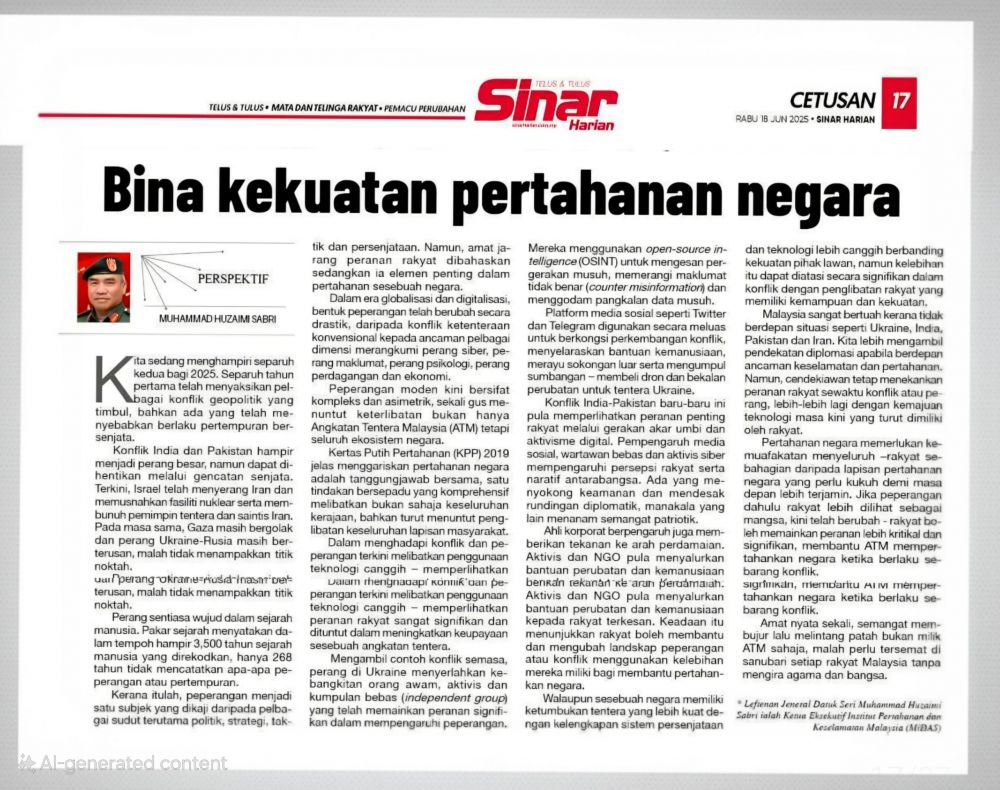
We are approaching the second half of 2025. The first half of the year has witnessed various emerging geopolitical conflicts, some of which have escalated into armed clashes.
The conflict between India and Pakistan nearly turned into a major war but was halted through a ceasefire. Most recently, Israel has attacked Iran, destroying nuclear facilities and killing Iranian military leaders and scientists. At the same time, Gaza remains in turmoil, and the Ukraine-Russia war continues with no clear end in sight.
War has always existed throughout human history. Historians note that in the nearly 3,500 years of recorded human history, only 268 years have been free of any war or conflict.
That is why war has long been studied from multiple angles, especially political, strategic, tactical, and in terms of weaponry. However, the role of the people is rarely discussed, even though they are a crucial element in a nation's defense.
In this era of globalization and digitalization, the nature of warfare has changed drastically—from conventional military conflict to multidimensional threats that include cyber warfare, information warfare, psychological warfare, trade wars, and economic warfare.
Modern warfare is now complex and asymmetric, requiring involvement not only from the Malaysian Armed Forces (MAF) but also from the entire national ecosystem.
The 2019 Defence White Paper (Kertas Putih Pertahanan, KPP) clearly outlines that national defense is a shared responsibility—a comprehensive, integrated action involving not just the entire government, but also participation from all layers of society.
Facing current conflicts and warfare involving advanced technologies highlights the significant and necessary role of the people in strengthening a military’s capabilities.
Taking the current Ukraine conflict as an example, we see the rise of civilians, activists, and independent groups playing a critical role in influencing the war.
They use open-source intelligence (OSINT) to track enemy movements, counter misinformation, and hack enemy databases.
Social media platforms like Twitter and Telegram are widely used to share updates on the conflict, coordinate humanitarian aid, rally external support, and raise funds—to purchase drones and medical supplies for Ukrainian troops.
The recent India-Pakistan conflict also demonstrated the important role of citizens through grassroots movements and digital activism. Social media influencers, independent journalists, and cyber activists shaped public perception and the international narrative. Some advocated for peace and urged diplomatic negotiations, while others stirred patriotic sentiments.
Prominent corporate figures exerted pressure towards peace, while activists and NGOs provided medical and humanitarian aid to affected populations. This shows that the people can influence and reshape the landscape of war or conflict using their strengths to support national defense.
Even if a country possesses superior military strength with more advanced weapons systems and technology, such advantages can be significantly neutralized in conflict when the people are involved and empowered.
Malaysia is fortunate not to be facing situations like those in Ukraine, India, Pakistan, or Iran. Our approach to security and defense leans more on diplomacy. However, scholars continue to emphasize the role of the people during times of conflict or war—especially now that technology, once exclusive to militaries, is also available to civilians.
National defense requires collective consensus—the people form a vital layer of national defense that must be strong for a more secure future. In the past, the people were mostly seen as victims of war. That has now changed—they can play a more critical and meaningful role in supporting the MAF in defending the nation during times of conflict.
It is abundantly clear that the spirit of unwavering determination ("bujur lalu, melintang patah") is not only for the Armed Forces, but must also be instilled in the hearts of all Malaysians, regardless of race or religion.
-Article by Lt Gen Dato' Seri Haji Muhammad Huzaimi bin Sabri, Chief Executive of MiDAS